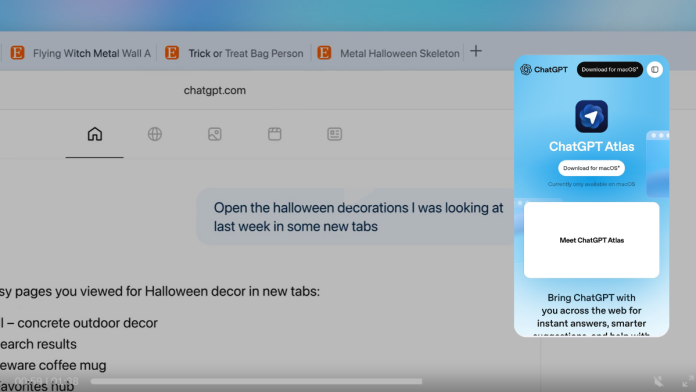
In a bold move that marks a new chapter in how we navigate the internet, OpenAI has officially launched ChatGPT Atlas: the world’s first web browser built around its flagship AI assistant, ChatGPT. The release, initially for macOS with versions for Windows, iOS and Android forthcoming, signals a shift in web browsing: from searching to conversing, from clicking links to having a smart assistant by your side. OpenAI
If you’ve ever wished your browser could think ahead, summarise pages, or finish tasks for you, ChatGPT Atlas aims to deliver that, and more. In this post we’ll walk through what it offers, what the early reactions are, and what to know before you jump in.
What is ChatGPT Atlas?
At its core, ChatGPT Atlas is a browser built on the same Chromium engine that powers many modern browsers – but with one major twist: the ChatGPT assistant is part of the browsing experience, not just an add-on.
Here are some of the standout features:
-
ChatGPT sidebar: While you’re on any webpage, you can open a ChatGPT panel to ask questions about that page, summarise content, compare products or analyse data without switching away.
-
Agent Mode (premium feature): For Plus or Pro users, ChatGPT Atlas can perform tasks by itself: navigate to websites, add items to a cart, schedule appointments, fill out forms. Essentially acting as your assistant online.
-
Browser memories & context: The assistant can draw on past browsing context and “memory” (if enabled) so that the conversation with ChatGPT “knows” your previous steps.
-
Privacy controls: OpenAI emphasises that by default browsing data will not be used to train its models; users have control over memory features and data sharing.
The Impact of This Launch
This is more than just another browser release – it’s potentially a pivot point in how we use the web. Here’s why it matters:
-
Challenging the status quo: The dominant browser, Google Chrome, holds roughly 70%+ market share globally. Atlas puts OpenAI in direct competition with that dominance.
-
Search business disruption: If more people ask an AI assistant instead of scrolling search result pages, ad models and traffic funnels could shift. Reuters suggests it might impact how search advertising works.
-
Redefining browsing behaviour: Instead of “type a query → hit enter → view links”, the experience is “talk/ask → get summarised/insights → optionally let the assistant act”. This step-change may reshape user habits.
-
Data access & insights: By controlling the browser layer, OpenAI gains deeper insights into how people browse, what they do online and what they ask. That can feed future AI capabilities.
What the Early Reviews Are Saying
Even though Atlas is brand-new, there are already several themes emerging from early testers and experts:
👍 The good
-
Many users like how the AI sidebar stays in the flow of browsing rather than forcing you to leave the page. For example, the ability to ask for a “make this more professional” edit in an email or summarise a long article.
-
The privacy-by-default messaging (opt-out for training data; memory is optional) gets favourable nods from those tired of “we collect everything” models.
👎 The cautionary signals
-
Performance and maturity: Some testers found it slower than traditional happening, and in one test adding three items to a cart took a long time.
-
Security & privacy risks: Several experts have raised alarms around new attack vectors unique to AI‐native browsers (see more below). techradar.com
-
Habit-change friction: Some users say that while the concept is exciting, they still fell back to familiar patterns (search engine → links) rather than fully trusting the new model. Futurism
Walkthrough: What Using ChatGPT Atlas Looks Like
Let’s break down how you might use Atlas in real life, so you get a feel for it.
-
Download & set up
-
At launch it’s available now for macOS. Versions for Windows, iOS and Android are coming soon.
-
You’ll sign in with your ChatGPT account, possibly import browser history or settings from another browser (optional).
-
Set your privacy controls. Decide whether “browser memories” is on or off.
-
-
In-page AI assistant
-
You land on a long article; you open the ChatGPT sidebar and type: “Summarise key points and list action items.” The assistant reads the page and gives you a crisp summary.
-
Later you highlight a sentence in an email draft and ask “Make this sound more authoritative” and the AI rewrites for you.
-
-
Agent Mode task delegation (Plus/Pro users)
-
You ask: “Find three weekend getaways within 3 hours of my city for under $500 each, book if good deal.” The agent opens tabs, compares options, selects a winner, books a hotel.
-
Important: OpenAI states this mode doesn’t yet have full system access (e.g., file system, auto‐installing extensions) and user watch is required.
-
-
Privacy & memory management
-
You can view which “memories” the assistant has stored (e.g., “You prefer Thai food”, “You’re planning a trip to Lagos”) and delete or disable as you wish.
-
You can choose incognito browsing where no memory is stored and no browsing data is used for training.
-
Strengths & Opportunities
-
Convenience & productivity boost: The integration of ChatGPT into real browsing means less switching apps, fewer copy-pastes, and more “ask once, done” experiences.
-
Accessibility: For users who prefer conversational interfaces over search engines, this approach could feel more natural.
-
Competitive edge for OpenAI: Having a browser gives OpenAI a direct touchpoint with how users navigate the web – an opportunity to innovate beyond chat.
-
Potential for new business models: If Atlas becomes popular, monetisation via built-in assistant services, subscriptions or even ads becomes viable.
Risks, Weaknesses & What to Watch
No major launch is without trade-offs. Here are some of the key things to keep in mind when thinking about ChatGPT Atlas:
Security & Attack Surface
-
Researchers have exposed that Atlas’s “omnibox” (the combined search/address bar) can be tricked via disguised URLs into executing hidden prompts. SecurityWeek
-
Agent Mode adds another layer of risk: when the browser is allowed to act autonomously on your behalf, the potential for unintended or malicious actions increases. Some analysts are calling it a “powerful new attack vector”. The National CIO Review
Privacy & Data Collection
-
While OpenAI emphasises opt-out training and user control, the fact remains that the browser offers “memory” features that track your browsing context. Some users / privacy experts argue this is more invasive than many standard browsers.
-
Because the browser integrates AI and browsing history, a bad actor gaining access to your account or prompts could gain more contextual insight than typical browsers allow.
Maturity & Performance
-
Some early reviews mention slower performance, unfinished features and general “first version” roughness. For example, one task “took 10 minutes to add three items to a cart” in a test.
-
As with any new product, compatibility with extensions, plugins, enterprise-deployments and cross-platform stability will take time.
Market adoption & user-behaviour
-
Breaking Chrome’s dominance is a tall order. Even with a compelling product, users must choose to switch browsers. A high-friction move.
-
For many users, the traditional search→links model is still very reliable; the AI-assistant model may take time to mature before mass adoption.
Who Should Try ChatGPT Atlas Now (and Who Might Wait)
Good fit if you:
-
Frequently use AI tools and want to embed that workflow into your web browsing.
-
Do a lot of research, reading long articles, or product comparisons and would benefit from summarisation or “assistant help”.
-
Don’t mind being an early adopter and are comfortable navigating first-version quirks.
Maybe wait if you:
-
Rely heavily on browser extensions, enterprise policies or non-Mac platforms (for now).
-
Are highly sensitive to privacy/data tracking and would prefer to wait for broad independent audits.
-
Require rock-solid performance, compatibility and minimal risk (in which case you may wait for a more mature version).
ChatGPT Atlas vs Google Chrome: Which Browser Defines the Future of the Web?
While Google Chrome has dominated the browser market for over a decade, OpenAI’s ChatGPT Atlas aims to redefine how we interact with the internet entirely. Instead of relying solely on search engines and manual navigation, Atlas integrates AI-powered assistance, automation, and real-time understanding to transform browsing into a smart, conversational experience.
Below is a detailed comparison between ChatGPT Atlas and Google Chrome across key features that matter most to users:
| Feature | ChatGPT Atlas (OpenAI) | Google Chrome (Google) |
|---|---|---|
| Core Technology | Built around ChatGPT’s AI language model, offering contextual understanding and natural conversation during browsing. | Based on Chromium engine focused on traditional web rendering and speed optimization. |
| User Interaction | Users can ask questions, summarize pages, or generate content directly inside the browser. | Users must manually search, click, and read through multiple pages to find answers. |
| Search Experience | Integrates AI-driven conversational search with real-time understanding and summarization. | Relies on Google Search results displayed in a standard list format. |
| Personalization | Learns user habits over time to tailor content recommendations and browsing flow. | Offers personalized search suggestions via Google account, but lacks deep contextual learning. |
| Extensions and Integrations | Expected to support AI-based add-ons and OpenAI ecosystem tools (e.g., DALL·E, Whisper). | Boasts the Chrome Web Store with millions of traditional extensions. |
| Privacy and Data Handling | Focuses on AI transparency and user consent, aligning with OpenAI’s ethical standards. | Google’s ecosystem heavily relies on data collection for targeted advertising. |
| Performance | Optimized for AI workloads and interactive prompts without switching tabs. | Known for speed, but often criticized for high memory (RAM) usage. |
| Cross-Device Sync | Uses cloud-based identity via OpenAI account, with potential smart-device syncing. | Seamless sync across devices via Google account. |
| Voice and AI Tools | Includes built-in voice interaction and multimodal AI capabilities. | Voice search available, but limited to query recognition. No contextual conversation. |
| Goal | To redefine browsing by merging search, content creation, and interaction. | To deliver fast and efficient access to websites and web apps. |
Implications for the Web Ecosystem
This launch of ChatGPT Atlas has ripple effects beyond just users installing a new browser. Here are some of the broader implications:
-
Search & advertising: If users increasingly get answers directly from the assistant without clicking through to websites, publishers and advertisers may need to re-think monetisation models.
-
Browser competition heating up: With Atlas entering the arena, browsers like Chrome, Edge, Brave, Opera and newcomer AI-browsers like Comet (from Perplexity) will face more pressure.
-
Data & platform power: The browser is a foundational platform. Whoever controls your browser experience wields significant influence over how you access services, how data flows, and how monetisation works. OpenAI has taken a step into that space.
-
New risk vectors: As browsers become smart agents rather than just rendering engines, the boundaries between apps/webpages/AI blur, and so do the security and privacy rules. Organisations will need to rethink browser policy and risk.
FAQ: Quick Answers to Key Questions
Is ChatGPT Atlas completely free?
Yes, there is a free version, available now on macOS. However, advanced features like Agent Mode are reserved for paying subscribers (Plus/Pro).
When will it come to Windows, iOS, Android?
OpenAI says versions for Windows, iOS and Android are “coming soon”. At launch it is macOS-only.
Does it use the same rendering engine as Chrome?
Yes, Atlas is built on Chromium (Blink engine), meaning compatibility with many existing web standards, though its core experience is built around ChatGPT.
Should I be worried about security?
You should be more aware than usual. Early independent research shows vulnerabilities like prompt injection and AI sidebar spoofing. Using strong passwords, monitoring what tasks you hand off to Agent Mode, and being cautious with enabled “memory” features is wise.
Also Read: Is OpenAI’s Sora the Best AI Video Editor of 2025?
Final Thoughts
The launch of ChatGPT Atlas marks a bold step for OpenAI and the browsing experience. It isn’t just a new browser. It’s a browser reimagined through the lens of conversational AI. For users who want a smarter assistant built into their web experience, this could signal a major shift.
However, as with any ground-breaking product, the first version comes with caveats. Privacy, security, performance and user adoption all present real questions. Whether Atlas becomes the next mass-adopted browser or remains a niche tool for early adopters depends on how OpenAI addresses those issues, and how comfortable users feel giving a browser extra agency.
If I were to pick just one takeaway: this is the moment when “browser” stops being just a window into the web and starts becoming your AI partner on the web. If you’re curious and willing to explore, it’s worth taking a look. If you rely heavily on your current browser setup and want minimal friction, keeping a watchful eye and waiting for version 2 might be the wiser bet.









